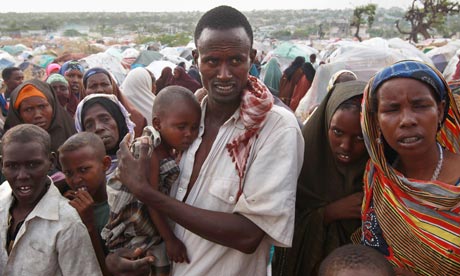
A man holds his three-year-old daughter at a camp for displaced persons in Mogadishu. Photograph: John Moore/Getty Images
The head of an international medical charity has called on aid agencies to stop presenting a misleading picture of the famine in Somalia and admit that helping the worst-affected people is almost impossible.
The international president of Médecins Sans Frontières (MSF), Dr Unni Karunakara, returned from Somalia last week and said that, even though there was chronic malnutrition and drought across east Africa, hardly any agencies were able to work inside war-torn Somalia, where the picture was "profoundly distressing". He condemned other organisations and the media for "glossing over" the reality in order to convince people that simply giving money for food was the answer.
According to Karunakara, agencies have been able to provide medical and nutritional care for tens of thousands in camps in Kenya and Ethiopia, which have been receiving huge numbers of refugees from Somalia. But trying to access those in the "epicentre" of the disaster has been slow and difficult. "We may have to live with the reality that we may never be able to reach the communities most in need of help," he said.
Karunakara said that the use of phrases such as "famine in the Horn of Africa" or "worst drought in 60 years" obscured the "man-made" factors that had created the crisis and wrongly implied that the solution was simply to find the money to ship enough food to the region.
He described Mogadishu, the Somali capital, as dotted with plastic sheets supported by twigs, sheltering groups of weak and starving people who had walked in from the worst-affected areas in southern and central Somalia. "I met a woman who had left her home with her husband and seven children to walk to Mogadishu and had arrived after five days with only four children," he said.
"MSF is constantly being forced to make tough choices in deploying or expanding our activities, in sticking to our principles of neutrality with the daily realities of people going without healthcare, without food. Our staff face being shot. But glossing over the man-made causes of hunger and starvation in the region and the great difficulties in addressing them will not help resolve the crisis. Aid agencies are being impeded in the area.
"MSF has been working in Somalia for 20 years, and we know that if we are struggling then others will not be able to work at all. The reality on the ground is that there are serious difficulties that affect our abilities to respond to need."
He said charities needed to start treating the public "like adults". He went on: "There is a con, there is an unrealistic expectation being peddled that you give your £50 and suddenly those people are going to have food to eat. Well, no. We need that £50, yes; we will spend it with integrity. But people need to understand the reality of the challenges in delivering that aid. We don't have the right to hide it from people; we have a responsibility to engage the public with the truth."
Chronic malnutrition, said Karunakara, is not new in east Africa and needs long-term action. "The Somali people have been living in a country at war, with no government, for 20 years, with several long periods of hardship, of famine and drought. This harvest failure is just what has tipped them over the edge this time, a catastrophe made worse," he said.
A brutal war between the transitional government, which is backed by western nations and supported by African Union troops, and armed Islamist opposition groups, notably al-Shabaab, is ongoing in Somalia. Fierce clan loyalties keep independent international assistance away from many communities, meaning that Somalis are trapped between various forces, depriving them of food and healthcare for political reasons.
"We face constant difficult challenges over simple things like a new nurse or getting a car," said Karunakara. "When we need to be saving lives with a fully fledged medical response, we constantly need to be communicating with both sides in a war, reminding them what humanitarian aid is. One needs only to look at how few charities are working in Somalia."
Ian Bray, a spokesman for Oxfam, said it was unhelpful for aid agencies to be seen to be arguing with each other.
"We're being honest with donors and we have always been honest," said Bray. "A drought is a natural occurrence; a famine is man-made. We don't go around to people saying we have a magic wand, give us £5 and we will make Africa feed itself. We do say give us £5 and we won't use it to give you a history of Somalia, but we will use our expertise to save lives. This is what the bargain is we make with our donors. If you support us, we will do our level best to alleviate the distress for those people in most dire need."
 (c) UN Photo
(c) UN Photo






